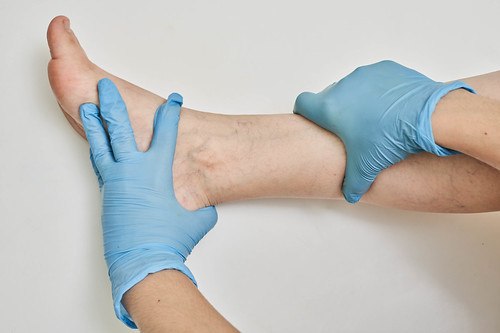When Should You See a Doctor for Foot Pain?
Most of us will experience pain or soreness in our feet, but it’s usually short-term and passes. Sometimes that’s not the case, and you need to seek medical care. Foot pain can be caused by many factors, including overuse, injury, or conditions that cause inflammation in bones, ligaments, or tendons in the feet. If pain, soreness, or limitation of movement doesn’t go away, it’s time to see a podiatrist or foot doctor. A podiatrist can diagnose what’s causing the issue and formulate a treatment plan to treat the symptoms you’re experiencing.
Common Foot Conditions that Cause Foot Pain

Many different factors can cause foot pain. Some of the most common foot conditions include the following.
Plantar Fasciitis
This condition affects the heel and causes inflammation of the tissue at the bottom of your foot. It can be caused by overuse of the feet, including repetitive motion, caused by exercise, sports, jobs that require a lot of standing and walking, or an unknown cause. Plantar fasciitis is usually extremely painful, so you’ll become aware of it immediately. You’ll likely experience more acute pain upon your first steps in the morning and after sitting for some time, but your pain can also be constant whenever you’re standing or walking. You’ll need to see a podiatrist for treatment.
Gout
Gout causes pain, which can also be accompanied by swelling and redness. Gout is caused by a form of arthritis in which your body generates too much uric acid. It affects the whole foot but mainly causes intense pain in the large joint of your big toe. You’ll need to be under the care of a rheumatologist for the underlying causes of the disease, and you may also require the care of a podiatrist to help manage the painful symptoms.
Arthritis
Other forms of arthritis can be responsible for soreness and pain in the feet, including Rheumatoid arthritis, an inflammatory joint disease in which your body’s immune system attacks your joints. You’ll need to see a rheumatologist, and you may also require the care of a podiatrist.
Broken Bones
Any break or fracture of any part of your foot will cause intense throbbing pain, as well as swelling, tenderness, and bruising. Any of these breaks or fractures will severely affect your ability to walk or put any weight on your foot. You will need to seek immediate medical attention. Initially, you may have to go to an emergency room, and after stabilizing treatment, you would follow up with a podiatrist for continued care.
Stress Fractures
These are tiny cracks in the bone, most likely caused by motions required by specific sports. Continuous running or repeated jumping can be the cause of these small fractures. Intense workouts can also create stress fractures. If you increase the intensity of your exercise routine, which includes the overuse of your feet, it can lead to a stress fracture.
Ingrown Toenails
This condition occurs when the corner of your toenail grows downward into your skin. It commonly affects the big toe but can occur in other toes, caused by wearing tight-fitting shoes or cutting your toenails improperly. You’ll experience discomfort and may also have swelling, redness, and the possibility of infection. While it may be tempting to try to treat this yourself, by trying to cut into the nail, you can cause more harm, as further injury can occur. Additionally, a more severe bone infection can occur if a podiatrist does not treat this condition.
Hammer Toe and Mallet Toe
Each of these common foot problems causes your toes to bend. It involves the second, third, fourth, and fifth toes to become bent through an imbalance of your tendons and muscles. This needs to be treated as your toes can become inflexible if not. There are non-surgical remedies for these conditions, but you’ll need to see a podiatrist before your toes become rigid. So, if you experience either of these conditions, it’s best not to wait before seeking care for your hammer toe treatment.
Corns and Calluses
Both of these conditions cause thick, hardened layers of skin on the feet and toes. Corns and calluses are caused by friction and pressure as your skin tries to protect itself. These can be unsightly and painless. However, if you have diabetes or any condition that causes restricted blood flow to your feet, you’ll need to seek care from a podiatrist.
Achilles Tendonitis or Tendon Tear
The Achilles tendon is a band of tissue that connects your heel bone to your calf muscle. Achilles tendonitis causes pain above your heel or in the back of your leg, usually caused by repetitive motion. The Achilles tendon is engaged when you run, jump, climb stairs, or push off with your foot, so excessive usage of your feet in any of these ways can lead to Achilles tendonitis. The other cause can be aging. In either case, you’re more at risk for this condition if you have flat feet or extreme tightening of your muscles.
If your pain becomes more severe, then you may have torn or ruptured your Achilles tendon. The symptoms include not being able to stand on your toes, bruising, swelling, feeling like you’ve been kicked in the calf, and hearing a popping sound at the initial time when your pain occurred. Whether you suspect Achilles tendonitis or an Achilles tear, care by a podiatrist is necessary.
When Should You Seek Medical Care?
If you’re experiencing severe pain, you should seek medical attention immediately. You should also see a medical professional in the case of severe swelling of the feet or ankles. Any redness or evidence of infection are also symptoms that require immediate attention. If you cannot place any weight on your feet, you should seek an emergency visit with a podiatrist, or if after office hours, an urgent care, or emergency room.
If your symptoms are less severe and aren’t causing intense pain or limited movement, but you’ve been having pain that hasn’t improved after several weeks, you should schedule an appointment with a podiatrist. This also applies if you’ve had swelling lasting over several days or if you’re experiencing numbness or tingling in your feet.
Located in Northern Illinois, with convenient offices in Chicago and Park City, Dr. Lisa Schoene possesses extensive knowledge, experience, and techniques to treat all foot conditions. Please feel free to contact Dr. Schoene at Gurnee Podiatry & Sports Medicine for a thorough evaluation of your foot conditions. She’ll examine your feet and then develop a treatment plan to alleviate your pain and treat your symptoms.
